Understanding Neurotypicals – A Guide for Autistics – Part 3 (Eye Contact)
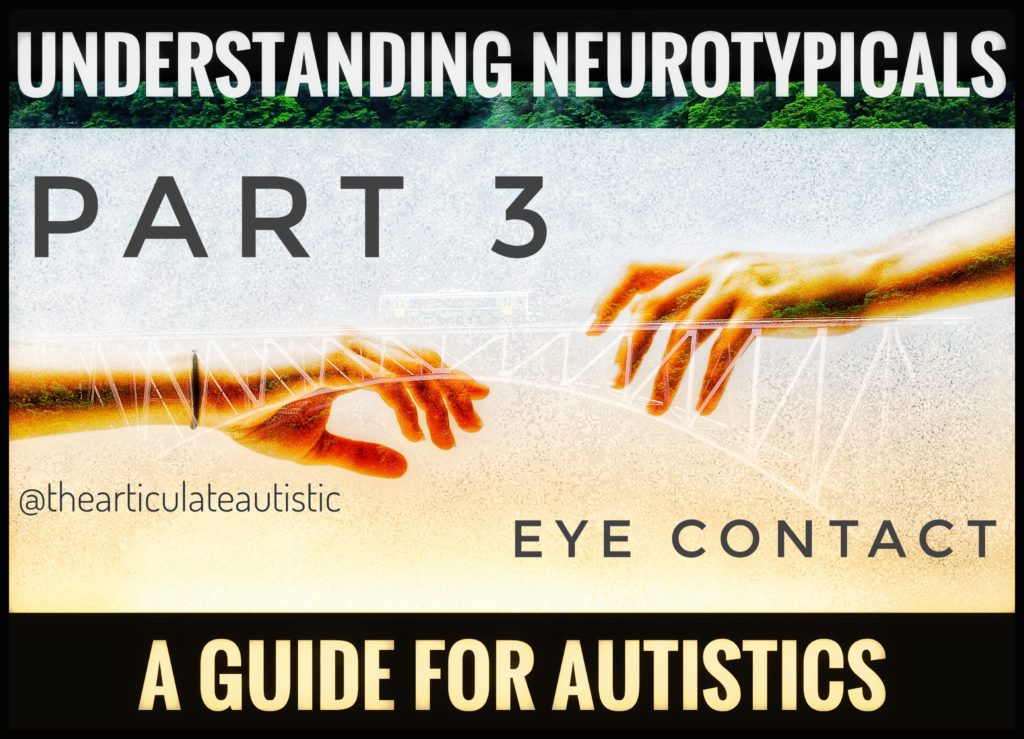
“Look me in the eye!” “Look at me when I’m talking to you.” “You don’t make eye contact. What are you hiding?” “She’s very strange. She won’t look you in the eyes.”
Eye contact appears to be very, very important to neurotypical people, and when an autistic person deviates from that norm, it can cause serious miscommunication problems. In part 3 of this series, I’ll share how my neurotypical volunteers view eye contact, and why it is important to them.
For me, eye contact feels invasive, uncomfortably intimate, and distracting. Looking someone in the eyes gives me the same feeling as accidentally skipping a step when walking downstairs. My stomach does this “flip-flop”, and I hate the feeling. I don’t connect to people through eye contact. In fact, just the opposite.
If I’m forced to make eye contact, I can’t even understand what the other person is saying to me. My senses are completely overtaken by the other person’s eyes and how I’m expected to stare at them while my brain screams at me to look away.
Like the concept of respect and why the word “why” is so offensive to neurotypical people, the eye contact thing has always confused and flustered me. It makes perfect sense to neurotypical people, but, for me, it’s something I truly can’t stand or understand. This has caused terrible miscommunications between myself and my neurotypical counterparts.
So, I asked my neurotypical volunteers how they feel about eye contact and why it is important to them.
Their responses are below.
What Eye Contact Feels Like for Neurotypical People
NT (Neurotypical) 1:
“Eye contact is very powerful. My son is autistic, and I know that when he looks me in the eyes he is really giving me something special.
Eye contact often feels like when opposite magnets glance over one another. It is fleeting and definitely felt but difficult to sustain.
It feels electric sometimes, like a jolt to the brain, but with the right person, shared eye contact communicates a sort of unison. With other non-verbal communication signals, such as smiling, or laughing, it can indicate sexual feelings
I know I can share my emotions with my 4 children very easily with eye contact. They know just by looking into my eyes whether I am cross or worried, etc.
I realise eye contact can also signify dominance.”
NT 2:
“Eye contact for me is a way to confirm on some level that the person is understanding me or hearing what I’m saying. I know a bit too much about this now, but speaking from a cultural perspective, it’s been accepted as polite, but that’s not in all cultures. In some cultures, it’s considered rude to make eye contact. I don’t worry about eye contact because I understand it from the perspective of individuals with autism having listened over the years to their side. If a person isn’t educated on such a thing, then they will take it as rude, weird, off-putting, etc., but it’s really not. My son never has had an issue with eye contact, and, in fact, it’s one of the reasons it took so long to get a diagnosis. People again thinking all individuals on the spectrum don’t like to make eye contact. I don’t personally find it uncomfortable, but when someone doesn’t want to make eye contact, it will signal to me that they may (not always) actually feel uncomfortable.”
There is also the biological part of eye contact for threat-detecting, watching another person’s facial expressions, etc., give me survival information such as, “Will they hurt me?”
NT 3:
“Eye contact feels really assuring and respectful. It means that the person is at least attempting to pay attention to the words coming out of my mouth. It was a major thing my mom taught me from the time I was very little. You look people in the eyes. You’re not listening if you’re not looking. It seems really weird now, honestly. I guess that’s why I find it pleasurable. It feels intimate. The purpose is to convey your respect and attention.”
My Thoughts in Conclusion:
For many autistic people, eye contact is painful and creates discomfort that feels like a low-grade panic attack the entire time it’s occurring. For most neurotypical people, however, it feels like respect, reassurance, and attention.
No WONDER we’re misunderstanding each other!
I look at the bridge of people’s noses. It seems to help. I’ll glance at eyeballs, but I can’t keep any lengthy contact on them, or I feel like I want to crawl right out of my skin. I’m OK with the compromise, but I very much want neurotypical people to understand that their autistic loved ones may not even be able to do what I do, and that’s perfectly OK. There is no rudeness or disrespect intended. Also, it doesn’t mean we’re not listening. In fact, many of us can listen much better when we are not forced to endure the discomfort of looking into another person’s eyes.
Books for Better Understanding the Autistic Brain
(Whether you’re an autistic person who is newly diagnosed, or you have a loved one on the spectrum, the books below can help you better understand the autistic brain.)
Want downloadable, PDF-format copies of these blog posts to print and use with your loved ones or small class? Click here to become a Patreon supporter!


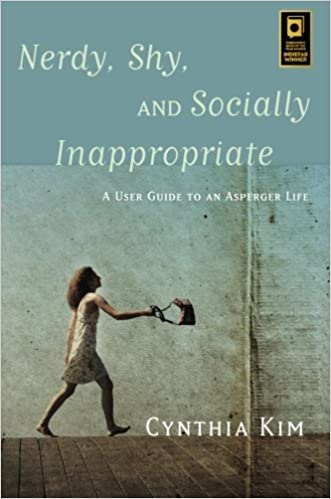


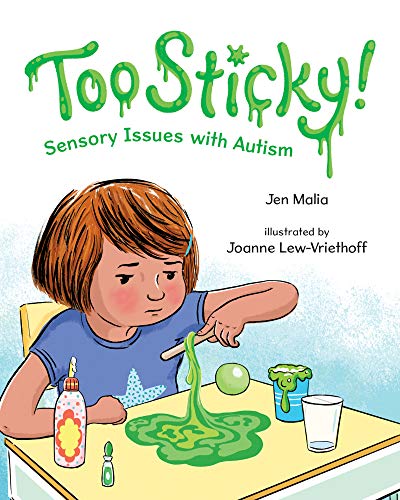
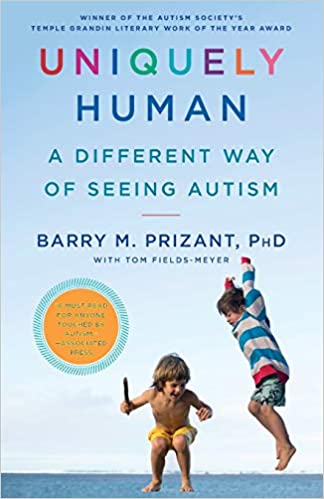
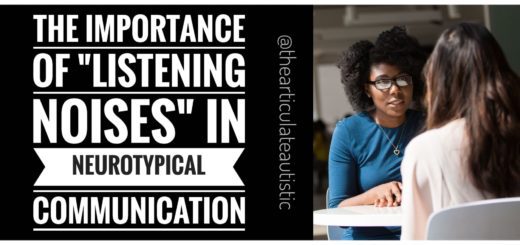



Thanks for those insights. Ehuke those 3 articles are excellent, it doesn’t really bring me closer to understand NTs.
It is like according to their comments, they just do it because it feels natural to them, but why? To me, just because something feels natural doesn’t mean that it should be done that way when there are objectiveky better ways to do something.